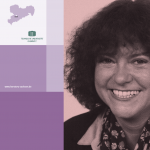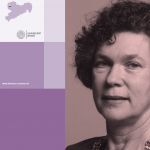
Composer and women’s rights activist
Ethel Smyth
Ethel Smyth’s unique career was almost thwarted by her parents. Only thanks to her stubbornness did she manage to study at the Royal Conservatory of Music in far-off Leipzig. This exceptionally talented woman later devoted herself to writing and politics. She fought for women’s rights in Britain together with the suffragettes. Born in Sidcup near London in 1858, Ethel Smyth grew up in a wealthy home. Through one of her governesses, who had studied at Leipzig Conservatory, Ethel came into contact with classical music early on – and also had the idea of studying music in Germany, too. Her parents were set against it, for at that time, music wasn’t regarded as an appropriate career goal for girls of her standing. Ethel Smyth defied her parents and went on hunger strike. Out of concern for their daughter, they finally relented. And in 1877, Ethel Smyth began studying at the Royal Conservatory of Music in Leipzig (now the Felix Mendelssohn Bartholdy University of Music and Theatre), attending for example piano and composition classes. In Leipzig she was introduced to Clara Schumann, Max Friedländer, Edvard Grieg and Johannes Brahms. She went on to enjoy success as a composer in both Britain and Germany. However, Ethel Smyth repeatedly encountered male prejudice and often felt like an outsider in the world of classical music. This is probably why she became involved in the British women’s rights movement, for which she even composed an anthem. In 1912, she was jailed for two months for taking part in protests. In those years, Ethel Smyth increasingly devoted herself to writing. In her autobiographical works, she intimated that she was gay. Ethel had a very close friendship with Virginia Woolf. Despite the onset of deafness, Ethel continued composing. By the end of her long life she had written six operas, several pieces for choir and orchestra, sonatas for chamber ensembles, and 20 songs with various accompaniment.
Fotonachweis: Hochschule für Musik und Theater „Felix Mendelssohn Bartholdy“ Leipzig, Bibliothek/Archiv (1, 2); Wikimedia Commons (3)
Renate Lieckfeldt 1965–2013 “Higher education means passion!” declared Renate Lieckfeldt ardently at the start…
Ausstellungseröffnung #herstory – Sachsen und seine Akademikerinnen Im Tietz der Stadt…
Marketing researcher and first woman at the helm of a university Cornelia Zanger Cornelia Zanger…
Physician and first female rector Beate A. Schücking After a long career in…







